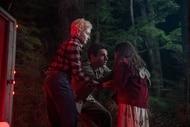This 1970s Universal Monsters Classic Is One of the Best Adaptations You Might've Missed
Though often ignored by modern audiences, the 1979 Dracula still packs loads of Gothic charm.

Dracula is one of those characters who gets reinvented for every generation, sometimes multiple times. Just in the last couple of years we've seen new versions of the character emerge in Renfield, Abigail, and The Last Voyage of the Demeter, and that's to say nothing of the dozens of straight-up adaptations of Bram Stoker's beloved novel. The Count gets around, and you'd be forgiven for missing a few of his many incarnations.
One such incarnation that often slips through the cracks arrived in 1979, when Universal Pictures launched a new version of Dracula that was, like the 1931 original, once again inspired by a hit stage production. This time around, the film got lavish new sets, a cast buoyed by legendary actors, a score by John Williams, and a dashing new star in the title role. In the 45 years since, this Dracula has often been overlooked in favor of incarnations by Bela Lugosi, Christopher Lee, and Gary Oldman, but because the film is now streaming on Peacock (just in time for Halloween), a whole new generation can discover it. And they should, because it's a sumptuous Gothic delight.
Why 1979's Dracula is essential viewing for Count Dracula completists
Like Bela Lugosi before him, Frank Langella honed his Dracula on the stage. He starred in a Broadway production of the story, based on Hamilton Deane and John Balderston's 1924 stage play, beginning in 1977, and quickly became a hit, particularly with female theatergoers who were entranced by his seductive persona. Langella, in developing his Dracula, began to see him as a dashing, misunderstood hero, a lonely being whose only comfort is the women he dares to seduce. The animalistic side of the Count is on display, but so too is an undercurrent of tragic romanticism, giving us a Dracula who, though he might be briefly loved, can never truly be understood.
When it came time to adapt the new Broadway production for the screen, that's exactly how producers Marvin and Walter Mirisch sold it, building on previous, more sexualized versions of the Count played by actors like Christopher Lee. This Dracula, the marketing told us, was feared by men, but loved by the women he enchanted with his supernatural prowess, and Langella looked every bit the romantic hero with his smooth, perfectly shaped hair and fitted tuxedoes. The almost statuesque posturing of Lugosi was gone, and so too was the more vicious side of Christopher Lee. This Dracula was the very definition of suave.
To accompany Langella to the big screen, director John Badham cast no less an acting titan than Laurence Olivier to play Abraham Van Helsing, and genre mainstay Donald Pleasence to play Van Helsing's comrade in arms, Dr. Jack Seward. The united front of Van Helsing and Seward as vampire hunters may be familiar to Dracula fans, as is the inclusion of Renfield (Tony Haybarth), but the rest of the cast gets a bit shuffled. There's still a Mina (Jan Francis) and a Lucy (Kate Nelligan), but their roles are reversed, with Mina playing the tragic early victim and Lucy playing Dracula's love interest. They're also both the daughters of the heroes, with Lucy as Seward's child and Mina as Van Helsing's.
Again, it's a bit of a shuffle, but it does make for an interesting dynamic going forward, as both Seward and Van Helsing are fighting for the lives and souls of their children. It adds an even deeper personal touch to the story, particularly when Van Helsing must consider doing the unthinkable to salvage his daughter's eternal spirit, and Pleasence and Olivier both play it well.
Then, of course, there's Langella, who's a real presence in this film. At first glance you might think his Dracula a bit too reserved, but it's all in the eyes. He's able to convince you that his Count could just be a normal rich guy trying to court a pretty lady, but with the flip of some internal switch he turns into a savage monster who seeks to consume all that's before him, one way or another. It's a masterful performance, a true case of someone making an iconic role their own, and it's essential viewing for any Dracula completist or fan looking for a different twist on the character.
But even more than Langella's power, what sticks out about the 1979 production is the sheer Gothic force of it all, from John Williams' wonderful score to the sets to the way Badham balances the luxuriant nature of Dracula with the cobwebs, grit, and darkness of the Yorkshire coastline. This is not the Dracula of the bright lights and sprawling parlors of London. Instead we get something a bit more infused with realism, which makes Dracula himself stand out all the more. It strikes a remarkable tonal balance.
So, while it might not be the greatest Dracula movie ever made, 1979's Dracula is still an essential when it comes to charting the history of the Count onscreen. This Halloween season, pull up Peacock and give it a try.
Dracula is now streaming on Peacock.























